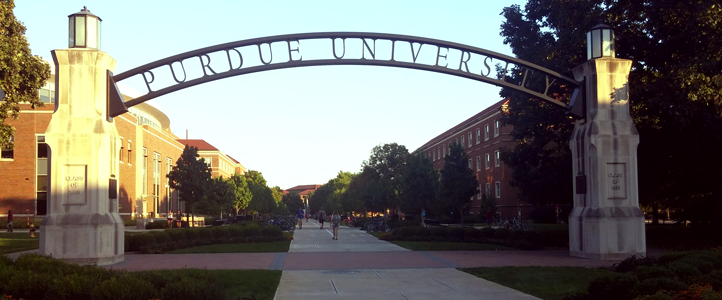
Engineering Disciplines
You can choose from among the following engineering disciplines offered at Purdue, which include opportunities for designing your own academic program. Professional academic advisors, faculty, and student advisors will assist you with academic and personal support services as needed. After successfully completing the First-Year Engineering requirements, you will be admitted into one of the professional schools of engineering.
|
Continue Purdue's proud aerospace tradition by pursuing the design and operation of aircraft for civilian or military markets (aeronautics) or rockets, spacecraft, and global space/international systems (astronautics). You can work in aviation, defense, space exploration-even the automotive industry.
|
|
As an agricultural engineer, you can develop environmental systems, processes, and machines to maintain the environment or generate or use energy, food, and water. Careers include work in natural resources, equipment design and manufacture, and materials handling, in areas such as agriculture, construction, mining, forestry, and lawn and ground care.
Biological engineers work in the large-scale manufacture of food, biological, and pharmaceutical products, applying basic scientific and engineering principles. Such products-biofuels, human therapeutics, new foods-are environmentally friendly and renewable, representing a future wave of consumer demand for better health and environment.
|
|
Biomedical engineers design solutions-devices, procedures, and materials-that apply the principles and methods of engineering and life sciences to human biology and medicine. Programs of focus at the Weldon School of Biomedical Engineering include biomaterials, neuroengineering, musculoskeletal biomechanics, tissue engineering, medical imaging, cardiovascular instrumentation, therapeutic and diagnostic devices, healthcare systems engineering, and biological signal processing.
|
|
With a degree in chemical engineering, you can work in a range of industries-including the chemical, energy, oil, biotechnology, consumer products, or pharmaceutical industries-that transform raw materials into beneficial products. Chemical engineers are vital in developing industrial processes that meet the world's demand for high-value-added products (petrochemicals, nutritional products, alternative energy, personal electronics, drug delivery systems, and more).
|
|
Civil engineers create the world's built environment: buildings and bridges; tunnels, dams, and levees; harbors and canals; water-supply and waste-disposal systems; airports, highways, and railroads; pipelines and power lines. They also protect the quality of our land, water, and air resources. Careers include structural, environmental, transportation, construction, hydraulic, geotechnical, and surveying engineering.
|
|
Purdue's unique program prepares you for technical and management responsibilities within the construction industry. Featuring three 12-week paid internships, the program has consistently placed 100 percent of its graduates in jobs upon graduation.
|
|
Electrical engineering offers opportunities in a very broad range of subfields. This includes everything from nanotechnology to robotics to utility scale power systems-pretty much anything that involves electricity, electronics, and electromagnetism. Today's world depends upon the technology developed and supported by electrical engineers, and the industries in which you can pursue a career include computers, communications, utilities, and all types of manufacturing (household products, consumer electronics, automobiles, etc.).
As a computer engineer, you will have the ability to develop both hardware and software by applying knowledge from subfields within both electrical engineering and computer science. Your possible career paths include developing and maintaining software, VLSI chip design, computer system design, and applications of digital systems in nearly every industry-computer, communications, information technology, automotive, and aerospace, to name a few.
|
|
Environmental and ecological engineers respond to environmental challenges and opportunities to improve drinking water quality, minimize and treat waste streams, remediate brown-quality. Careers include work in water treatment, industrial ecology, life cycle assessment, sustainable design, environmental policy, risk management and public health engineering.
|
|
Industrial engineers design human-integrated systems that produce products and services that people can use effectively and efficiently. Combining expertise in math, engineering, and the management and behavioral sciences, industrial engineers design and streamline industrial or logistical processes, incorporate human factors, ensure quality control on the plant floor, and design manufacturing plants. Careers include work in healthcare, postal/package delivery services, airlines, space programs, hospitals, banking, amusement parks, manufacturing, and more.
|
|
If you want an engineering education but don't plan to practice engineering, you can develop an individual plan of study at the interface between engineering and other disciplines. This flexible program offers established plans of study (Pre-Medical Engineering Studies, Theatre Engineering Studies, and more), or you can design your own.
|
|
Materials engineers are at the forefront of nanotechnology, biomaterials, and microelectronics, as well as traditional technical fields. A degree in this discipline equips you to analyze the structure and composition of metals, plastics, ceramics, composites, and other materials-at the atomic level through the macroscopic-to control their strength, thermal conductivity, and other properties for custom-tailored results. Materials engineers work in industries including healthcare, the automotive industry, aero/astro companies, consumer products, energy production, and sports.
|
|
Mechanical engineers work across virtually all industries in design, manufacturing, and production, developing products, machinery, and systems including engines and turbines, vehicles, building services, and industrial plants. As a mechanical engineer, you can pursue a career from sectors including aerospace/defense, automotive, biotechnology and pharmaceuticals, chemical and petroleum, computers and electronics, construction, consumer and food products, energy and nuclear, engineering consulting, and heavy off-road equipment.
|
|
If you plan to practice engineering but your specific career goals fall outside the traditional engineering fields, this flexible, accredited program allows you to develop an individual plan of study at the interface between engineering and other disciplines. Choose an established plan of study (Acoustical Engineering, Engineering Management, and more) or design your own.
|
|
As a nuclear engineer, you can help create economical, safe nuclear power plants that protect the environment (reducing greenhouse gas emissions); design the fusion reactors of the future; create systems for deep-space missions; combat cancer; develop semiconductors and other cutting-edge materials; or safeguard national security through steward-ship of nuclear weapons. The School of Nuclear Engineering offers three main areas of study: Energy Materials and Radioactive Waste Management, Nuclear Fusion, and Nuclear Power Engineering.
|


